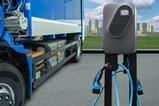Nexyad, a leading provider of real-time data analysis systems, has partnered with Volta Trucks to enhance driving safety in the urban environment.

The collaboration aims to introduce a next-generation driving coaching and scoring system that promotes safer driving practices for drivers of the Volta Zero.
Nexyad’s real-time platform utilises hybrid physics-informed artificial intelligence to aggregate and interpret data from various onboard sources in Volta trucks. By analysing this data in real-time, Nexyad provides drivers with simple and relevant information to develop a prudent driving style, minimising risks for themselves and other vulnerable road users.
The key feature of Nexyad’s system is the provision of a maximum prudent speed recommendation based on real-time data aggregation. This recommendation takes into account multiple factors such as legal speed limits, road roughness, topography, weather conditions, and traffic. By going beyond the European requirement for Intelligent Speed Assist (ISA), which primarily focuses on speed limit compliance, Nexyad’s system provides drivers with proactive guidance on the safest speed to maintain given the current driving conditions.
In addition to the maximum prudent speed recommendation, Nexyad’s safety coach, SafetyNex, acts as a virtual co-pilot, providing anticipation guidance to help drivers avoid emergency situations that could lead to accidents.
The data gathered by Nexyad’s system is also used to generate a safety score for each driver, reflecting their driving style and overall safety performance. This score acts as a catalyst for various solutions that promote safer driving practices. Fleet managers can closely monitor and track their drivers’ performance, allowing for targeted training and improvement programmes. Insurance companies can accurately assess risk levels based on individual driver profiles and offer customised premiums that incentivise safer driving habits.
To test the effectiveness of Nexyad’s safety coach technology and driving score, Volta Trucks will be conducting trials with prototype vehicles over the next few months. The collected data will be made available to the truck operating company, which can utilise it based on existing agreements with their drivers.


















